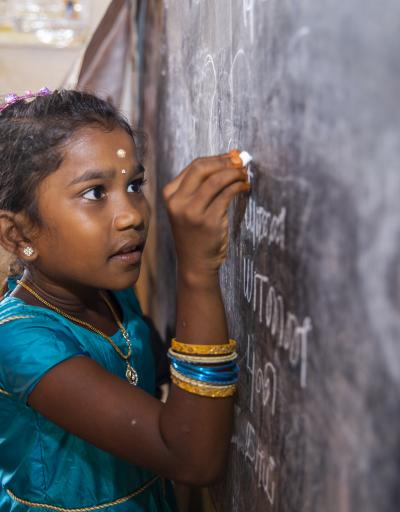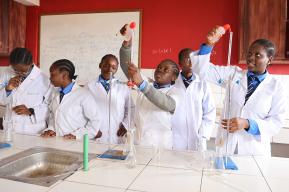
Article
Q&A: How gender stereotypes in early learning keep girls out of maths and science

Meet Juliane Hencke and Matthias Eck, two of the authors of “Early learning activities matter for girls’ and boys’ mathematics and science achievement.” Juliane is Director of the International Association for the Evaluation of Educational Achievement (IEA) Hamburg. Dr Matthias Eck is a Programme Specialist in the Section of Education for Inclusion and Gender Equality at UNESCO. They explain why early learning matters especially learning activities that foster numeracy for girls.
How can maths and science be a part of early learning activities for children?
In general, early learning activities play an important role in a child’s development. There is a wide range of activities that parents can do with their children to develop numeracy and literacy skills.
Counting, building blocks, construction toys, writing numbers, and drawing shapes builds numeracy skills. Singing, writing, reading, telling stories, and talking about what one has done builds literacy skills. Early literacy is a fundamental skill for all subjects. It also has a high association with science achievement.
Why does early learning matter for girls’ future STEM studies and careers?
Science, technology, engineering, and mathematics (STEM) industries are at the centre of innovation. They are the jobs of the future, driving social well-being, inclusive growth and sustainable development.
In most countries girls are doing as well as boys in maths and science. Yet, girls are less likely than boys to pursue technology-related studies. Globally, in 2018, only 28% of engineering and 40% of computer science graduates were women.
Early learning generates confidence and interest. Children's attitudes to science and maths are influenced by their close family environment. Parents should engage their daughters in numeracy-related early learning activities. Engaging girls in such activities builds their interest and confidence in science and maths.
Do parents' play differ with their boys and girls?
Parents report often engaging in early learning activities with their children in questionnaires issued through IEA’s Trends in International Mathematics and Science Study (TIMSS).
But we see that parents do more early learning activities with girls than with boys. With daughters, parents do more singing, rhymes, writing, drawing, and reading activities. With sons, they play more with building blocks and construction toys.
How do parents’ early home learning activities affect boys’ and girls’ maths and science achievement?
All kinds of early learning activities improve children’s maths and science achievement. This is independent of the child’s gender. But we see that the estimated return in maths and science achievement is higher for boys than for girls.
Independent of gender, early literacy activities have a strong relationship to science achievement. A possible explanation is that science tasks in schools often involve reading comprehension.
What can we do to support parents develop their girls’ abilities and interest in STEM?
Providing children with various numeracy and literacy activities develops skills and interests.
Parental outreach programmes can help parents to avoid gender-stereotyped play with their children, and promote equal learning pathways.
Parents should be encouraged to read more books to their children, especially their boys, and to do more numeracy-related play with girls, including spatial play. This can cover different topics, genres, and formats including literary and informational texts.
It is important to make parents aware of the tendency to choose activities based on gender stereotypes. And it is necessary to overcome these biases.
We encourage advocacy on this via different channels. This includes through exchanges with parents in and around ECCE learning spaces, but also through encouragement by pediatricians, radio and TV ads or other media.







